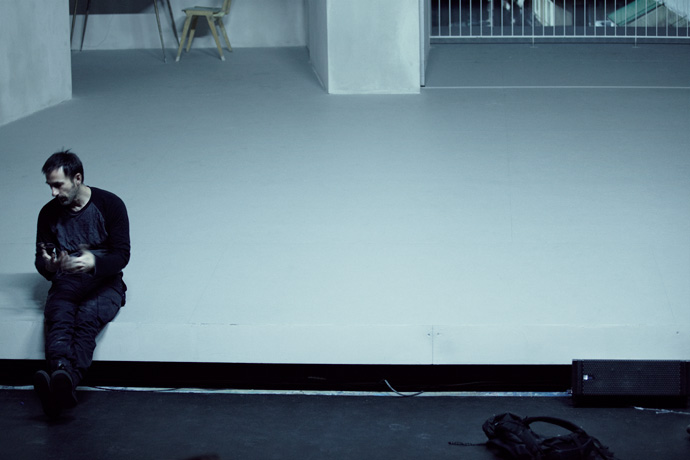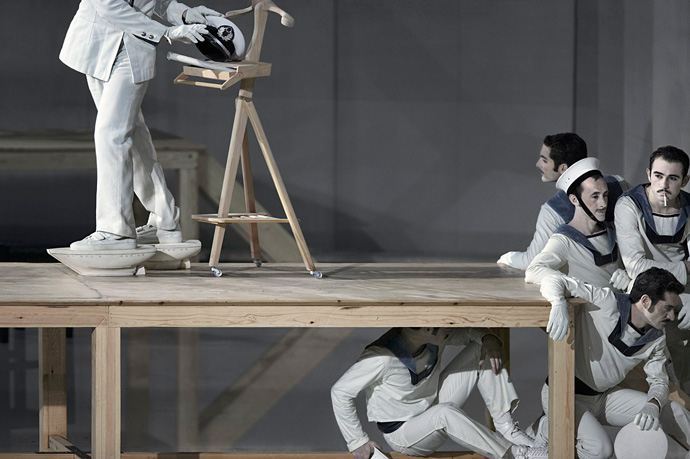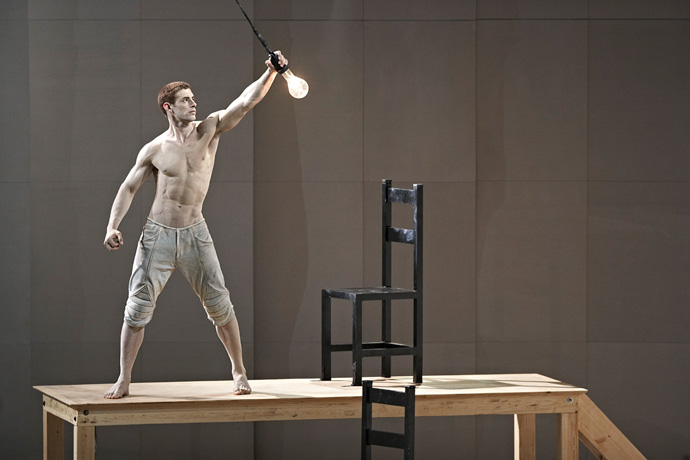-

dimitris papaioannou : a pasolinian touch
-Dimitris Papaioannou’s work as a choreographer has significantly reshaped the Greek performing arts landscape.
With his directing of the Athens 2004 Olympic Games Ceremony, a ground-breaking success, he played his way straight in the heart of the spectators, hailed a “triumph” by TIME MAGAZINE and THE TIMES of LONDON.In 2005 Dimitris Papaioannou was awarded the Golden Cross of the Order of Honour by the President of the Hellenic Republic for outstanding artistic achievement. For his following shows “2″ and MEDEA2 enjoyed an unprecedented run in the Greek capital, each with over 100 000 tickets sold. This accelerated development came not without controversy. With his latest play INSIDE Dimitris returns to his experimental roots.
THE STIMULEYE met with him during a break of rehearsals in Athens, to speak about his new play and look back to his point of departure.
Following the first part of three on the conversation with Dimitris Papaioannou, accompanied with exclusive pictures by René Habermacher. Dimitris Papaioannou on the rehearsal set for his new play INSIDE. Photo by René Habermacher
Dimitris Papaioannou on the rehearsal set for his new play INSIDE. Photo by René Habermacherpasolinian touch
DIMITRIS PAPAIOANNOU: I’ll be right with you — I’m just making a coffee!
RENÉ HABERMACHER: You’re freshly shaven! You look very 19th-century with your moustache.
I am from the 19th century honey, I’m very old!
It’s been a while since we had time for a talk, since I left Athens and you last visited Paris. We met only briefly during the rehearsals for your new play INSIDE, which you’re currently working on. You spent last Spring in New York. Tell me about what you did there.
I was there from March until June on a Fulbright Artist’s Scholarship. A mid-career scholarship obviously… [laughs]
Actually in a way I was studying the story of performance art [with Laurie Anderson at The Kitchen NYC] and developing my Final Cut Pro skills, as well as experiencing a little more of New York life, now that I’m a mature boy and things are different!
How was it returning to Athens after that?
For me it was a blessing because I discovered that I had left New York when I was still under construction. It’s the perfect place to be when you are like that, but in this phase of my life what I found there was a little more superficial than I would have liked. The Athens I returned to was in complete economic crisis and emotionally depressed, but still I was deeply relieved to spend summer back home.
Dimitris, I know you were born in Athens, but we’ve never talked about your childhood.
I was born and grew up in Athens, in a lower-middle class family. My parents made financial sacrifices so that I could go to a very expensive school, the Athens College. Then I had to run away from home because my parents wanted me to live the life of a straight architect. But I was a gay man, and I wanted to be a painter. I became the student of the Greek painter Yannis Tsarouchis* (1) in the old fashioned way, where painters trained people in their atelier. It was there I was introduced to true art. I had been painting since I was a child, but it was when I met Tsarouchis that I realised what painting really was. Later I entered the Athens School of Fine Arts.
* (1) : Yannis Tsarouchis, 1910-1989 One of the most important twentieth-century Greek painters, Yannis Tsarouchis portrayed and helped to define modern Greek identity. The deeply sensual painter was much influenced by the French impressionists and often depicted sailors, soldiers and the nude male body in erotic situations.
 The departure of Jason in reference to Yannis Tsarouchis. Scene from MEDEA2 by Dimitris Papaioannou
The departure of Jason in reference to Yannis Tsarouchis. Scene from MEDEA2 by Dimitris PapaioannouHow did you meet Tsarouchis?
I knocked on his door. I showed him some my paintings and asked for his comments. He was not cruel, as he could have been, about those awkward early drawings — instead he was very polite. My college had organised an exhibition of my work in the building’s library, so I invited Tsarouchis to see my work up close. The next day he called me and invited me back to his house, after which he allowed me to watch him paint, and would give corrections on my paintings. I became his student.
How did this encounter shape you? Did it leave a mark on your artistic work?
Well, your first mentor leaves a strong mark on your life. I grew up in a house that had no contact with artists, there wasn’t a single painting on the walls. My parents weren’t very fond of art, it wasn’t part of their lives. I felt like an alien, wanting to enter this world. So Tsarouchis was the first artist I really saw working, and I realised that the life of an artist is possible and, to my eyes, very charming. I felt at home in a way. And he was a great painter. He had a quality that interests me a great deal: he could make magic with the humblest of materials — he could make roses out of toilet paper, use wires to make small sculptures. The thing I think I have learned from him is that you can make poetry out of garbage.
 “Helios”. Scene from MEDEA2 by Dimitris Papaioannou. Photo by René Habermacher10
“Helios”. Scene from MEDEA2 by Dimitris Papaioannou. Photo by René Habermacher10